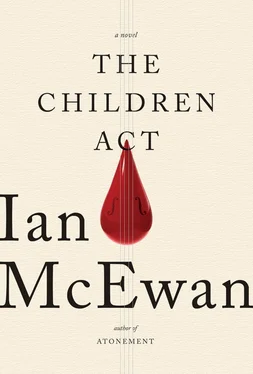In an effort of memory, Grieve closed his eyes and quoted from Section 8 of the Family Law Reform Act of 1969. “The consent of a minor who has attained the age of sixteen years to any surgical, medical or dental treatment which, in the absence of consent, would constitute a trespass to his person, shall be as effective as it would be if he were of full age.”
All those who met him, Grieve said, were struck by Adam’s precocity and maturity. “My Lady would be interested to know that he has read aloud some of his poems to the nursing staff. To great effect.” He was far more thoughtful than most seventeen-year-olds. It was necessary for the court to have regard to the position had he been born a few months earlier, when his fundamental right would have been secure. With the full support of his loving parents, he had made clear his objection to treatment and he had articulated in detail the religious principles on which his refusal rested.
Grieve paused, as if to reflect, then gestured toward the door through which the consultant had exited the courtroom. It was perfectly understandable for Mr. Carter to despise the idea of withholding treatment. This merely demonstrated the professional devotion one would expect of so eminent a figure. But his professionalism clouded his judgment as to Adam’s Gillick competence. Ultimately, this matter was not medical. It was legal and moral. It concerned a young man’s inalienable right. He understood perfectly well where his decision could take him. To an early death. He had made himself clear many times. That he did not know the precise manner of his dying was beside the point. No one judged to be Gillick competent could be in full possession of that kind of knowledge. Indeed, nobody was. We all knew we would die one day. None of us knew how. And Mr. Carter had already conceded that the team treating Adam would not wish to impart to him such an understanding. The young man’s Gillick competence rested elsewhere, in his manifest grasp of the fact that refusing treatment could lead to his death. And Gillick, of course, rendered otiose the issue of his age.
So far, the judge had made three crowded pages of notes. One of these, on a separate line, was “poetry?” Rising from the stream of argument was one bright image—supported by pillows, a teenage boy reading his verses to a tired nurse, who knew she was needed elsewhere but was too kind to say so.
Fiona had written poetry when she was Adam Henry’s age, though she had never presumed to read it aloud, not even to herself. She remembered quatrains daringly unrhymed. There was even one about death by drowning, of sinking deliciously backward among the river weeds, an improbable fantasy inspired by the Millais painting of Ophelia, before which she’d stood enraptured during a school visit to the Tate. This daring poem in a crumbling notebook, on whose cover were doodles in purple ink of desirable hairstyles. As far as she knew, it lay at the bottom of a cardboard box, somewhere at the far end of the windowless spare room at home. If she could still call it home.
Grieve concluded that Adam was so near to eighteen as to make no difference. He satisfied the conditions articulated by Scarman, and was Gillick competent. The barrister quoted Balcombe LJ. “As children approach the age of majority they are increasingly able to take their own decisions concerning their medical treatment. It will normally be in the best interests of a child of sufficient age and understanding to make an informed decision that the court should respect.” The court must take no view on a particular religion, save to respect expressions of faith. Nor should the court be tempted onto the dangerous ground of undermining an individual’s basic right to refuse treatment.
Finally it was Tovey’s turn and he was brief. With the help of his cane he pushed himself to a standing position. He represented both the boy and Marina Greene, the boy’s guardian, and his tone was studiously neutral. The arguments for both sides had been well put by his colleagues and all relevant points in law had been covered. Adam’s intelligence was not in question. His grasp of scripture as understood and propagated by his sect was thorough. It was important to consider that he was almost eighteen, but the fact remained, he was still a minor. It was therefore entirely for Her Ladyship to decide the weight she should apportion to the boy’s wishes.
When the barrister sat down there was silence as Fiona glared at her notes, ordering her thoughts. Tovey had helpfully narrowed them to a decision. Addressing him, she said, “Given the unique circumstances of this case, I’ve decided that I would like to hear from Adam Henry himself. It’s not his knowledge of scripture that interests me so much as his understanding of his situation, and of what he confronts should I rule against the hospital. Also, he should know that he is not in the hands of an impersonal bureaucracy. I shall explain to him that I am the one who will be making the decision in his best interests.”
She went on to say that she would travel now with Mrs. Greene to the hospital in Wandsworth and, in her presence, would sit at Adam Henry’s bedside. Proceedings were therefore suspended until Fiona’s return, when she would give judgment in open court.
Three

THIS, FIONA DECIDED as her taxi halted in heavy traffic on Waterloo Bridge, was either about a woman on the edge of a crack-up making a sentimental error of professional judgment, or it was about a boy delivered from or into the beliefs of his sect by the intimate intervention of the secular court. She didn’t think it could be both. The question was suspended as she looked to her left, downstream toward St. Paul’s. The tide was running out fast. Wordsworth, on a nearby bridge, was right, either direction, best urban prospect in the world. Even in steady rain. At her side was Marina Greene. Beyond desultory small talk as they left the Courts of Justice, they had not spoken. Only proper, to keep a distance. And Greene, oblivious or well used to the upstream view on her right, was intent on her phone, reading, tapping, frowning in the contemporary manner.
On the South Bank side at last, they turned upriver at walking pace and took almost fifteen minutes to reach Lambeth Palace. Fiona’s phone was off, which was her only defense against the compulsion to check texts and e-mail every five minutes. She had written but not sent a message. You cannot do this! But he was doing it, and the exclamation mark said it all—she was a fool. Her emotional tone, as she sometimes referred to it and which she liked to monitor, was entirely novel. A blend of desolation and outrage. Or longing and fury. She wanted him back, she never wanted to see him again. Shame was also a component. But what had she done? Lost herself to work, neglected her husband, let one long case distract her? But he had his own work, he had his various moods. She had been humiliated and didn’t want anyone to know and would pretend that all was fine. She felt tainted by secrecy. Was that it, was that the shame? Once in the know, one of her sensible friends was bound to urge her to phone him to demand an explanation. Impossible. She still recoiled from hearing the worst. Every thought she had now about the situation she’d indulged several times before, and still she went round again. Treadmill thinking, from which only sleep, medically induced, could rescue her. Sleep, or this unorthodox excursion.
At last they were on the Wandsworth Road and making twenty miles an hour, the speed of a horse at full gallop. They passed on the right an old cinema converted to squash courts where, many years ago, Jack had played to the limits of endurance to make eleventh place in an all-London tournament. And she, loyal young wife, somewhat bored, placed well back from the glass-fronted court, peeping from time to time at her notes on a rape case she was defending, and would lose. Eight years for her outraged client. Almost certainly blameless. Rightly, he never forgave her.
Читать дальше













